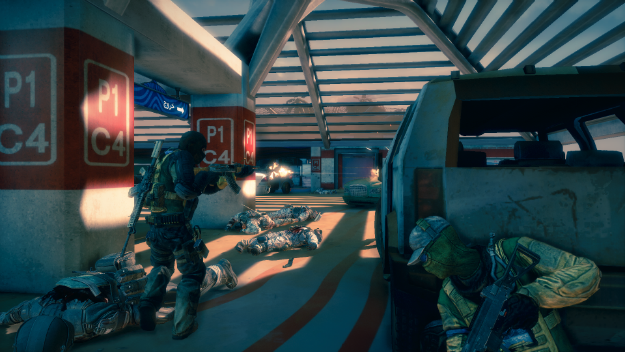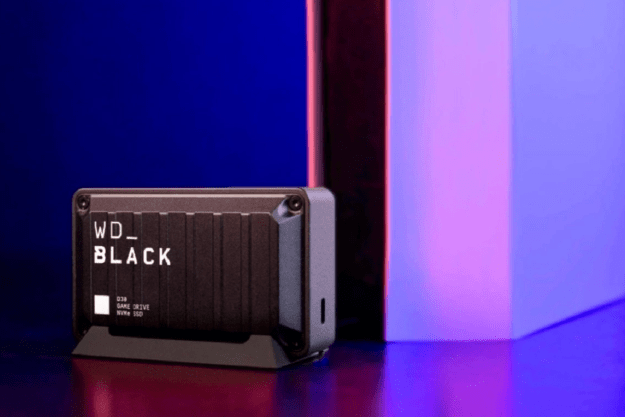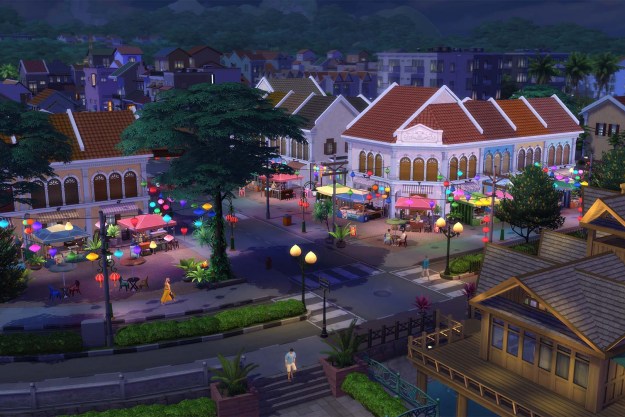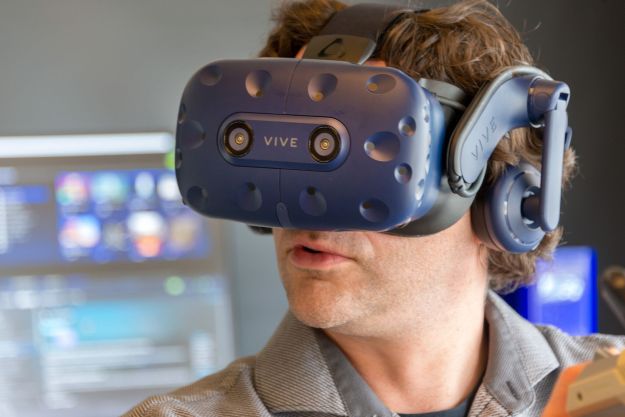
It’s hard enough to make a game about soldiers and guns stand out in the modern video game market, but harder still to do it at E3 when every publisher on the planet is bludgeoning people with images of buildings exploding, helicopters crashing, and semi-bearded men screaming about reloading.
Cory Davis, creative lead on 2K Games and Yager Development’s Spec Ops: The Line, has to face both the challenge of making his third-person shooter stand out from the crowd but also convince people to play it without a competitive multiplayer mode. Before sitting down to try its bonus co-op missions at E3 2012, Davis talked about the challenges of getting publishers to take risks, how to name your game, and why people are finally getting tired of violence in video games.
Spec Ops: The Line was designed to challenge people’s moral conceptions about shooting video games. Why?
There are a lot of games that just don’t do that and those that do don’t do it very well. If we’re going to develop a game in this genre, we had to do something different to start with. As developers, as gamers, we’ve matured. Me personally, when I play a shooter, I’m looking for something that challenges me. Not all the time. I’m not saying those other games aren’t fun or that they’re not good. They do what they do extremely well, but what we’re doing is a lot different.
Why do you think there are so few games that try to make people think about violence?
It’s a cycle. If you like at war films from the pre-Vietnam era, they were very gung ho and heroic. They wanted to remind people how awesome America is. After the Vietname War though, people came home with a lot of different experiences, experiences that affected them emotionally and those people came back and made films or got involved with films. Apocalypse Now, Full Metal Jacket, The Deer Hunter, Platoon—these really dive into not just the body of a soldier but also the mind of a soldier. They’re not necessarily realistic films, but they are authentic to what these soldiers feel and the psychological journey that they go on. We really want to do for games what those movies did for film. We want to show a strong character arc and evolution for our characters. Where they start is different from where they end up in the game. We have a great opportunity since you’re in control with a game, so we can build a different type of relationship than you can with characters in a film. We let you make some decisions as these characters that really bind you to the things that happen between them. We also stay with these characters through their journey through Dubai when they’ve been cut off from the world. It’s a human story. It’s not about politics, it’s not about their ability to overcome anything.

We wanted to focus on our single-player first and foremost. Throughout development, it’s always tempting to say, okay, let’s make a co-op game. Co-op games sell, people are looking for that, but at the same time, I think there’s a gap in the single-player experiences in a lot of games. For us, to be able to touch on these horrific topics—the terror of war, the soul of man, the heart of darkness—we didn’t want you to be tea-bagging your buddy while you’re trying to make a meaningful decision.
Yeah, that would probably ruin the moment.
Or having your buddy to it to you is even worse! But this is a third-person, cover-based shooter where you’re part of a squad and our AI is built to tackle multiple threats. We love playing co-op as well. We wanted to show a different part of the narrative with the co-op even though it isn’t really narrative focused. You get to embody a bunch of different characters in different contexts. You get to play as refugees trying to escape an internment camp for example. Or you play as Exiles, former members of [antagonist] Conrad’s force that have defected, and you’re going in to assassinate your former commanders. It’s not necessary to get the most out of the story.
There’s a good deal of fatigue settling on the industry when it comes to shooters, especially at this year’s E3. It’s more than that there are so many shooters though, it’s that people are exhausted by the violence. You guys seem to be trying to combat that with your story. Why do you think that it’s now that people are pushing back when shooters have been so popular for so many years?
There are a lot of different factors. Like I said, I think that players as a group have matured but the games we play haven’t matured with us. That’s not to say that every game needs to be a meaningful emotional experience. I love playing all these heroic games as well—they give a lot of strong feedback, they’re very powerful, a lot of fun, very cool, and they’re well developed. They have value, but there’s something missing. Gamers overall though are looking for something more meaningful. We’re pushing in one direction with Spec Ops. The technology is now giving us opportunities to do things we weren’t able to do in the past. This game we’re developing here, even if we’d tried to do it earlier this generation, we would have struggled to do some of the emotional stuff we do. The lighting, things we can do with the sand making the environment come to life and not just be a backdrop, we can do new things. We’ll be forced to do new things because that’s what people are looking for.
Speaking of this generation of consoles, game budgets skyrocketed when the Xbox 360 came out back in 2005. The sheer cost of making a high-definition game crippled a lot of developers and many publishers were scared off of investing in original ideas. What do you think is going to convince publishers to invest in original ideas in the future?
It’s really tough. You have to take risks. A lot of times though, taking a risk doesn’t always result in the desired outcome. Some people would rather just play it safe. Luckily there are publishers out there willing to take some of those risks, and if they’re successful as they do that, other people will follow suit. Developers especially say, “We don’t want to work on something we don’t carry about.” Or, “We want to work on something that pushes the envelope.” 2K for example was always on board with that. They stand out and they wanted to take risks with us right from the start. Even at E3 2010, we had a lot of stuff we were excited about, some scenes we thought were impactful, but at the same time when we went to focus test our main storyline, we found that a lot of the story wasn’t hitting home as much as we wanted. You can imagine if we set off on this path to make something we thought was meaningful and then miss the mark, it would probably hurt not just us but studios trying to do similar things. Publishers would say, “Oh look at that game. It didn’t work!”
I hope that’s not the case though. We had 16 different nationalities working on this game, and we fostered that international perspective on everything. There was a lot of strong, healthy debate about all of these topics. Just to get our squad mate actors to understand what we’re trying to accomplish, we brought them into the office with everyone, fine tuning and iterating with them. 2K was right there the whole time pushing alongside us to make sure it came out right. I’m excited, but it’s risky.
Branding is a really hard thing to do with shooters. Everything has such similar names. Hearing the name Spec Ops: The Line right next to something like Ghost Recon: Future Soldier, it’s tough for the average consumer shopping at Walmart to distinguish between those things. What are the challenges in deciding what to call your game?
It’s always a big debate. For me personally as a gamer, I knew about the Spec Ops franchise and what it was about, but what we’re doing is so different that I think when people take a look at it, it’ll set us apart in the future. What I want is that, in a few years when people hear the name Spec Ops, they don’t think of those past games or other games, they think of this game we’ve made.
The cards were stacked against us, and that pushed us to find ways to make the game stand out. The color scheme for example. We had to intentionally make sure we didn’t make a generic brown shooter. Our technology was heavily focused on that throughout development. We had a really, really strong tech and lighting team making sure that Dubai came to life. Then we had to make sure that these characters were going through things that meant something to people. It’s a challenge. It is. The Line, that name, has a lot of meaning to us. We want people to think about what it’s actually like for soldiers to cross this line that they have to every day, those decisions they’re going to make in order to survive, and how those decisions psychologically effect them in the long term.


